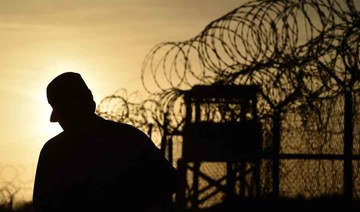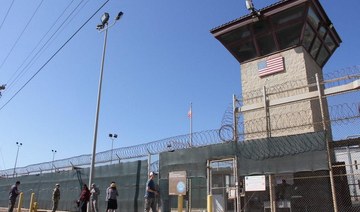FORT MEADE, Maryland: A Guantanamo Bay prisoner who went through the brutal US government interrogation program after the 9/11 attacks described it openly for the first time Thursday, saying he was left terrified and hallucinating from techniques that the CIA long sought to keep secret.
Majid Khan, a former resident of the Baltimore suburbs who became an Al-Qaeda courier, told jurors considering his sentence for war crimes how he was subjected to days of painful abuse in the clandestine CIA facilities known as “black sites,” as interrogators pressed him for information.
It was the first time any of the so-called high value detainees held at the US base in Cuba have been able to testify about what the UShas euphemistically called “enhanced interrogation” but has been widely condemned as torture.
“I thought I was going to die,” he said.
Khan spoke of being suspended naked from a ceiling beam for long periods, doused repeatedly with ice water to keep him awake for days. He described having his head held under water to the point of near drowning, only to have water poured into his nose and mouth when the interrogators let him up. He was beaten, given forced enemas, sexually assaulted and starved in overseas prisons whose locations were not disclosed.
“I would beg them to stop and swear to them that I didn’t know anything,” he said. “If I had intelligence to give I would have given it already but I didn’t have anything to give.”
Khan, reading from a 39-page statement, spoke on the first day in what is expected to be a two-day sentencing hearing at the US base in Cuba.
A panel of military officers selected by a Pentagon legal official known as a convening authority can sentence Khan to between 25 and 40 years in prison, but he will serve far less because of his extensive cooperation with US authorities.
Under a plea deal, which the jurors were not told about, Khan’s sentence by the jury will be reduced to no more than 11 years by the convening authority, and he will get credit for his time in custody since his February 2012 guilty plea.
That means he should be released early next year, resettled in a third, as yet unknown country because he can’t return to Pakistan, where he has citizenship.
Some of Khan’s treatment is detailed in a Senate Intelligence Committee report, released in 2014, that accused the CIA of inflicting pain and suffering on Al-Qaeda prisoners far beyond its legal boundaries and deceiving the nation with narratives of useful interrogations unsubstantiated by its own records.
Khan agreed with that assessment. “The more I cooperated and told them, the more I was tortured,” he said.
He spent about three years in CIA black sites before he was taken to Guantanamo in September 2006. He said he never saw the light of day in the black sites and had no contact with anyone other than guards and interrogators from his capture until his sixth year at the detention center on the base in Cuba.
Khan, 41, has admitted to being a courier for Al-Qaeda and taking part in the planning of several plots there were never carried out. He pleaded guilty in February 2012 to charges that include conspiracy, murder and providing material support to terrorism in a deal that capped his sentence in exchange for cooperating with authorities in other investigations, including the case against the five men held at Guantanamo who are charged with planning and providing logistical support for the Sept. 11 attack.
A citizen of Pakistan who was born in Saudi Arabia, Khan came to the US with his family in the 1990s and they were granted asylum. He graduated from high school in the Baltimore suburbs and held a technology job in the D.C. area at an office where he could see the smoke billowing from the Pentagon on Sept. 11, 2001.
He says he turned to radical ideology following the death earlier that year of his mother, whom he described as the most important person in his life.
Khan apologized for his actions and said he takes full responsibility. He said he now just wants to reunite with his wife and the daughter who was born while he was in captivity. He said he has forgiven his captors, and his torturers.
“I have also tried to make up for the bad things I have done,” he said. “That’s why I pleaded guilty and cooperated with the USA government”
Khan is the first of the high-value detainees, those who went through the interrogation program, to be convicted and sentenced at the military tribunals held on the base.
The five men charged in the Sept. 11 attacks include Khalid Shaikh Mohammad, who has portrayed himself as the architect of the plot. That case remains in the pretrial stage and a judge has said it will start no sooner than next year.
The US holds 39 men at the detention center on Naval Station Guantanamo Bay.
Prisoner gives Guantanamo court first account of CIA abuse
https://arab.news/j2hpx
Prisoner gives Guantanamo court first account of CIA abuse
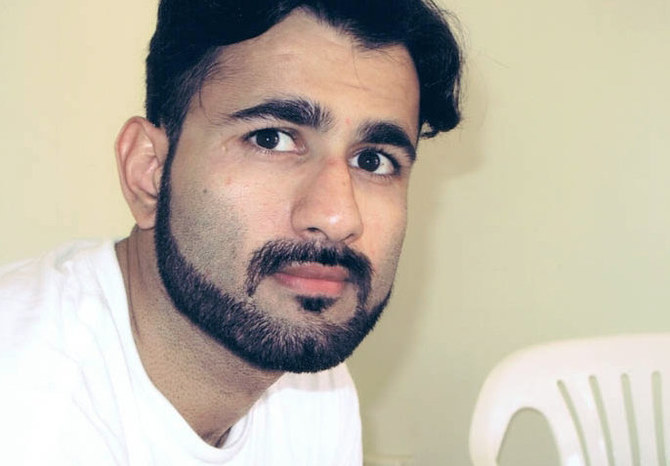
- Majid Khan was a former resident of the Baltimore suburbs who became an Al-Qaeda courier
- He spent about three years in CIA black sites before he was taken to Guantanamo in September 2006
Suspected Kashmir rebels kill Indian air force corporal
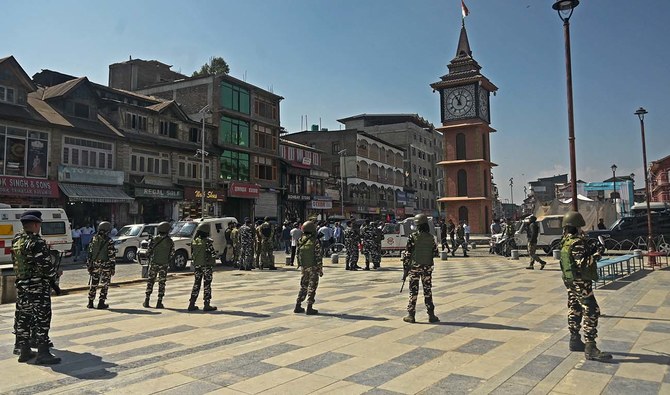
- Suspected rebels ambushed military convoy in Indian-administered Kashmir, Indian Air Force says
- Since 1989, rebel groups opposed to Indian rule have waged insurgency in disputed territory
SRINAGAR, India: An Indian air force member was killed and four more injured when suspected rebels ambushed a military convoy in Indian-administered Kashmir, an official statement said, as campaigning for national elections continues in the disputed territory.
The convoy was attacked by an unknown number of armed militants who sprayed automatic rifle fire toward at least one air force truck in the mountainous Poonch area, 200 kilometers (124 miles) south of the main city of Srinagar, the air force said in a statement.
Five air force personnel were hit in the firefight late Saturday and “one Air Warrior succumbed to his injuries later,” it said, identifying the dead man as a corporal.
A neighboring constituency took part in the first phase of India’s general election on April 19, and Poonch voters were originally scheduled to cast their ballots this week but the Election Commission of India has postponed the polling to May 25 because of inclement weather in recent days.
Kashmir has been divided between India and Pakistan since their independence in 1947, with both claiming the high-altitude territory in full but administering it in parts.
Since 1989, rebel groups opposed to Indian rule have waged an insurgency in Indian-controlled Kashmir, demanding either independence or a merger with Pakistan.
The conflict has left tens of thousands of civilians, soldiers and militants dead.
Rebel activity in the territory has registered an uptick since last month as campaigning for the elections picked up in the restive region.
In April, three suspected rebels were killed and a police officer and three soldiers wounded in three separate clashes across the territory.
Violence has drastically dropped since 2019, when Prime Minister Narendra Modi’s government revoked the region’s limited autonomy and stepped up a security chokehold.
Voting in India’s six-week-long national election, which started last month, will end on June 1.
Driver dies after crashing into White House perimeter gate, Secret Service says

- The driver was not immediately identified
WASHINGTON: A driver died after crashing a vehicle into a gate at the White House Saturday night, authorities said.
The driver was found dead in the vehicle following the crash shortly before 10:30 p.m. at an outer perimeter gate of the White House complex, the US Secret Service said in a statement.
Security protocols were implemented but there was no threat to the White House, the agency said.
The driver was not immediately identified.
The Secret Service will continue to investigate the matter, while turning over the fatal crash portion of the investigation to the Washington Metropolitan Police Department, the agency said.
Fake videos of Modi aides trigger political showdown in India election

- Indian police arrest nine people for circulating fake video of Indian Home Minister Amit Shah
- With more than 800 million Internet users, tackling misinformation in India is a huge challenge
BENGALURU/LUCKNOW: Manipulated videos are taking center stage as campaigning heats up in India’s election, with fake clips involving two top aides of Prime Minister Narendra Modi triggering police investigations and the arrest of some workers of his rival Congress party.
In what has been dubbed as India’s first AI election, Modi said last week fake voices were being used to purportedly show leaders making “statements that we have never even thought of,” calling it a conspiracy “to create tension in society.”
Indian police — already investigating the spread of fake videos showing Bollywood actors criticizing Modi — are now investigating a doctored online clip that showed federal home minister Amit Shah saying the ruling Bharatiya Janata Party will stop certain social guarantees for minorities, a subject sensitive for millions of voters.
Shah retorted on X, posting his “original” and the edited “fake” speech and alleging — without providing any evidence — that the main opposition Congress was behind the video it created to mislead the public. The minister said “directions have been issued to the police to address this issue.”
Indian police arrested at least nine people, including six members of Congress’ social media teams, in the states of Assam, Gujarat, Telangana and New Delhi last week for circulating the fake video, according to police statements.
Five of the Congress workers were released on bail, but the most high-profile arrest made by the cybercrime unit of New Delhi police came on Friday, when they detained a Congress national social media coordinator, Arun Reddy, for sharing the video. New Delhi is one region where Shah’s ministry directly controls police. Reddy has been sent into three-day custody.
The arrest has sparked protests from Congress workers with many posting on X using the #ReleaseArunReddy tag. Congress lawmaker Manickam Tagore said the arrest was an example of “authoritarian misuse of power by the regime.”
Congress’ head of social media, Supriya Shrinate, did not respond to messages and an email seeking comment.
MISINFORMATION
India’s election from April 19 to June 1 will be the world’s largest democratic event. With nearly a billion voters and more than 800 million Internet users, tackling the spread of misinformation is a high stakes job. It involves round-the-clock monitoring by police and election officials who often issue take down orders to Facebook and X as investigations start.
In India’s most populous state of Uttar Pradesh, more than 500 people keep tabs on online content, flagging controversial posts and coordinating with social media companies for their removal when needed, police chief Prashant Kumar told Reuters on Saturday.
Another fake video that sparked a storm last week showed Yogi Adityanath, the state’s chief minister, criticizing Modi for not doing enough for families of those who died in a 2019 militant attack. Though fact checkers said the video was created using different parts of an original clip, state police called it an “AI generated, deepfake.”
Using Internet address tracking, state police arrested a man named Shyam Gupta on May 2 who had shared the fake video post on X a day earlier, receiving over 3,000 views and 11 likes.
The police have accused Gupta of forgery and promoting enmity under Indian law provisions that can carry a jail term of up to seven years if convicted. Reuters could not reach him as he is currently serving a 14-day custody period.
“This person is not a tech guy. Had he been tech savvy, arresting him quickly would not have been possible,” said police officer Kumar.
Australian police shoot boy dead after stabbing with ‘hallmarks’ of terrorism

SYDNEY,: Australian police said on Sunday they had shot dead a boy after he stabbed a man in Western Australia’s capital Perth, in an attack authorities said indicated terrorism.
There were signs the 16-year-old, armed with a kitchen knife, had been radicalized online, state authorities said, adding they received calls from concerned members of the local Muslim community before the attack, which occurred late on Saturday night.
The attack, in the suburb of Willetton, had “hallmarks” of terrorism but was yet to be declared a terrorist act, police said.
“At this stage it appears that he acted solely and alone,” Western Australia Premier Roger Cook told a televised press conference in the state capital Perth, regarding the attacker.
The victim, stabbed in the back, was stable in hospital, authorities said.
Prime Minister Anthony Albanese said he had been briefed on the incident by police and intelligence agencies, which advised there was no ongoing threat.
“We are a peace-loving nation and there is no place for violent extremism in Australia,” Albanese said on social media platform X.
The incident comes after New South Wales police last month charged several boys with terrorism-related offenses in investigations following the stabbing of an Assyrian Christian bishop while he was giving a live-streamed sermon in Sydney, on April 15.
The attack on the bishop came only days after a stabbing spree killed six in the Sydney beachside suburb of Bondi.
Gun and knife crime is rare in Australia, which consistently ranks among the safest countries in the world, according to the federal government. (Reporting by Sam McKeith in Sydney; Editing by Christian Schmollinger and William Mallard)
North Korea’s UN ambassador says new sanctions monitoring groups will fail
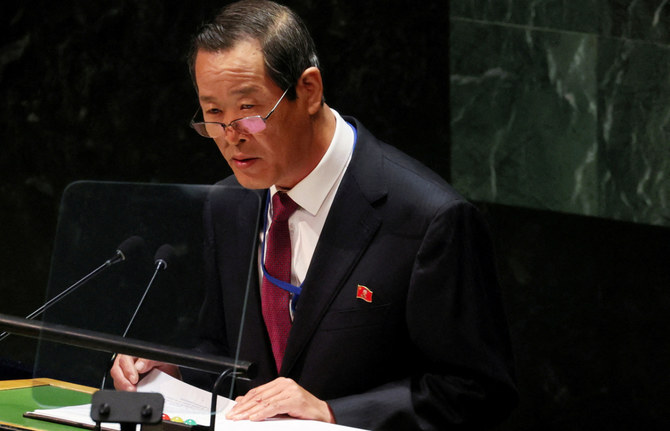
- Earlier this year, Russia vetoed the annual renewal of a panel of experts amid US-led accusations that North Korea has transferred weapons to Russia for use in its war in Ukraine
SEOUL: Efforts led by the US and other Western countries to form new groups to monitor sanctions on North Korea will fail, the country’s UN envoy said on Sunday, according to state media KCNA.
Ambassador Kim Song made the comment in response to a joint statement the US and its allies issued this week calling to continue the work of a UN panel of experts monitoring longstanding sanctions against Pyongyang for its nuclear weapons and missile programs.
Earlier this year, Russia vetoed the annual renewal of the panel amid US-led accusations that North Korea has transferred weapons to Russia for use in its war in Ukraine.
“The hostile forces may set up the second and third expert panels in the future but they are all bound to meet self-destruction with the passage of time,” KCNA quotes Kim as saying in a statement.
Last month, US Ambassador to the United Nations Linda Thomas-Greenfield visited the Demilitarized Zone, a heavily fortified border between the two Koreas, which remain technically at war and urged Russia and China to stop rewarding North Korea for its bad behavior.
Her trip came after Russia rejected the annual renewal of the multinational panel of experts that has over the past 15 years monitored the implementation of UN sanctions aimed at curbing North Korea’s nuclear and missile programs.



